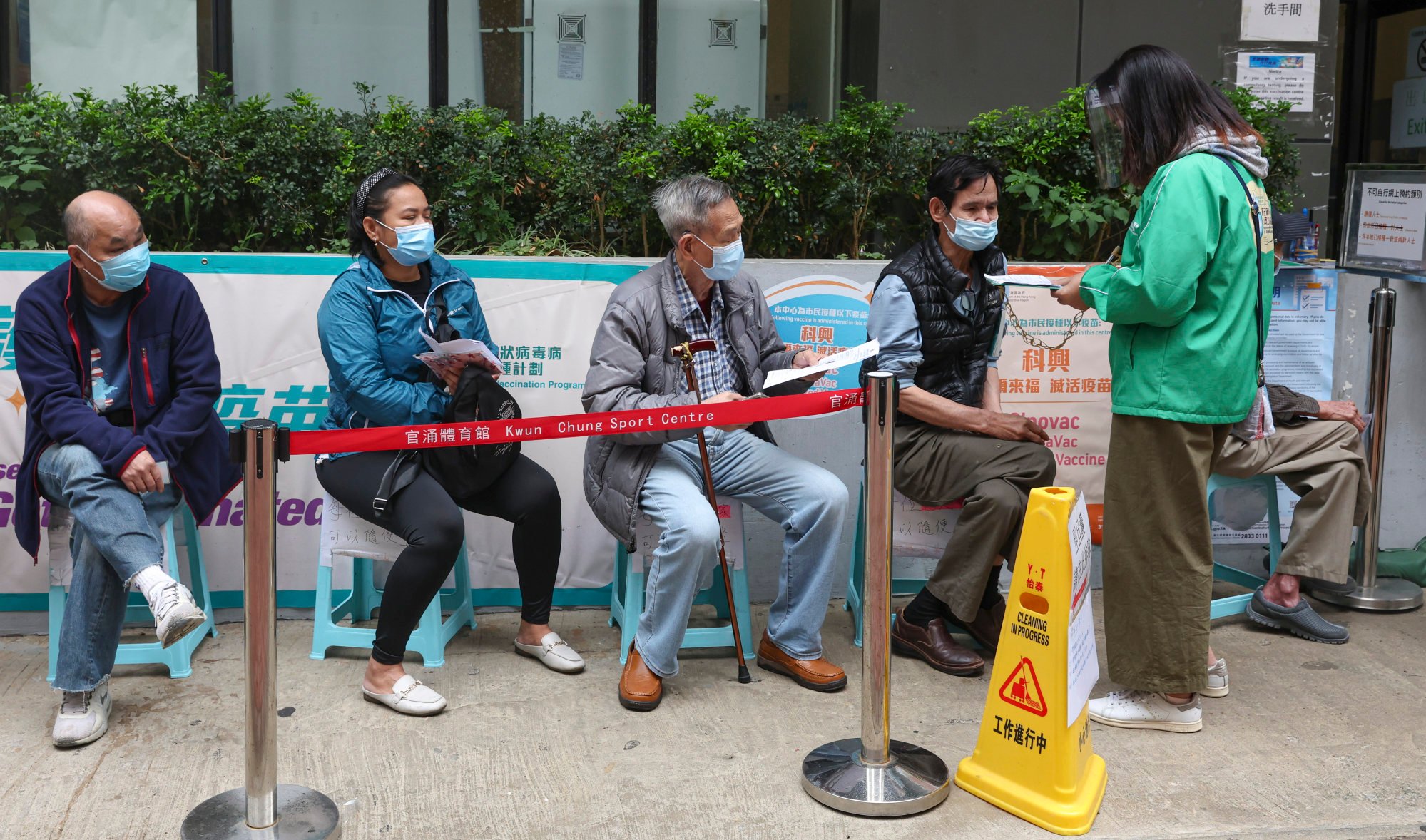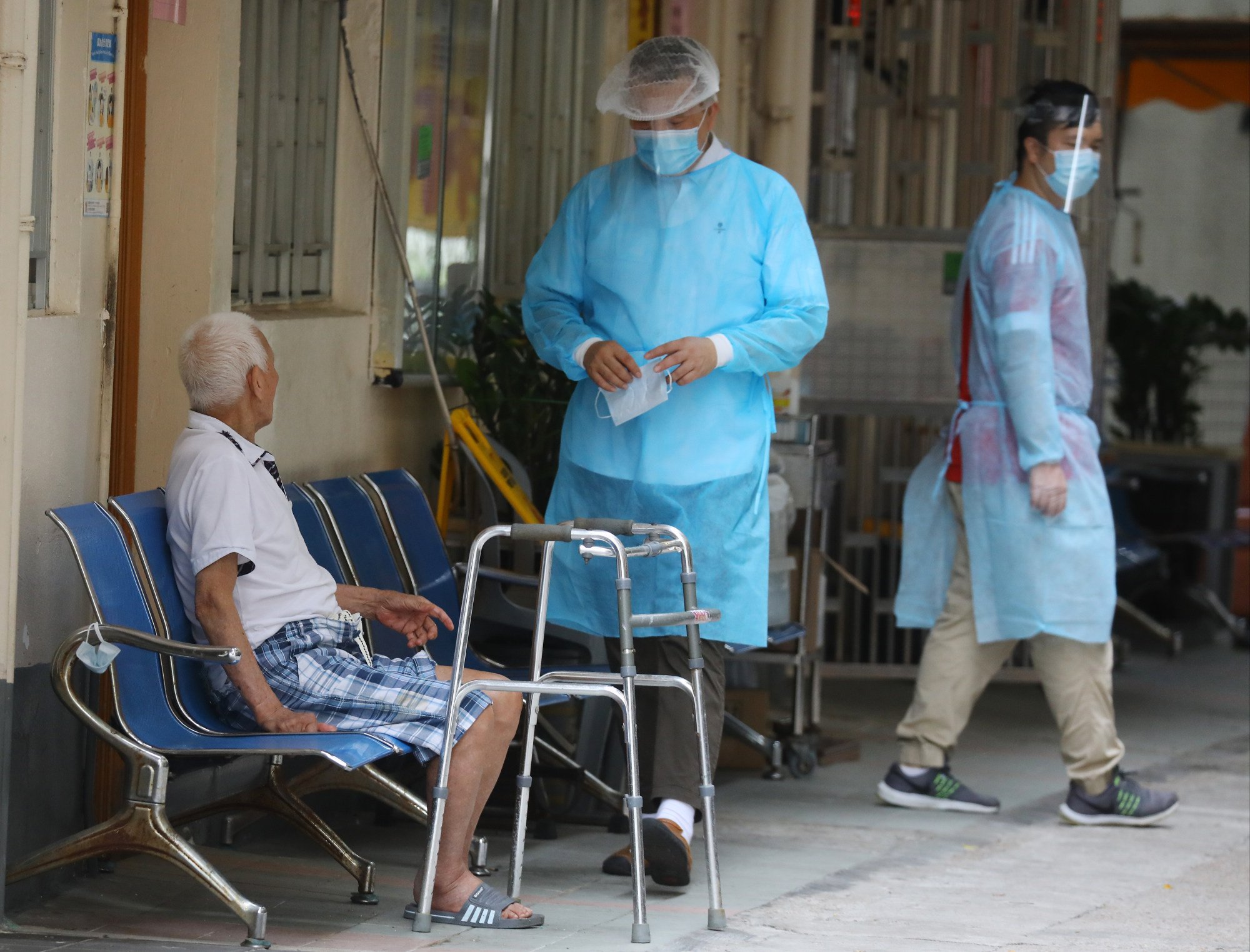
Coronavirus: Hong Kong care home staff ‘to undergo weekly PCR tests’ in government’s first move to shore up defences; 3,256 new cases logged
- Measure will be a step up from fortnightly screening, with workers still having to take daily rapid tests; rule set to come into force on July 27
- Hong Kong reports 3,256 new Covid-19 infections, including 237 imported ones, and four more virus-related deaths
Hong Kong’s new government has made its first move to shore up defences against a resurgent fifth wave of coronavirus infections at vulnerable institutions by requiring staff at care homes for the elderly and the disabled to take polymerase chain reaction (PCR) tests for Covid-19 once a week instead of every fortnight.
The measure, which could take effect as soon as July 27, came as the sector clashed behind the scenes with the government and health experts over another anti-pandemic plan: the readiness of care homes for quarantining infected residents on site, which doctors said was needed to prevent overloading hospitals, the Post has learned.
The increasing spotlight on care facilities follows concern among authorities over Omicron-fuelled waves overseas putting continued pressure on hospitals.
“We have seen some other countries, like Britain and Australia, where their health facilities are under great stress. We are also worried, higher caseloads will pile more pressure on the Hospital Authority especially,” said Dr Chuang Shuk-kwan, head of the Centre for Health Protection’s communicable disease branch.
In a strongly worded article titled “The NHS is not living with Covid, it’s dying from it”, editors-in-chief of the British Medical Journal on Tuesday said weekly admissions of Covid-19 patients by England’s National Health Service had been more than 9,000 on average in the first 6½ months of this year, compared with under 6,000 in 2021 and fewer than 7,000 in 2020.
Hong Kong on Tuesday reported 3,256 new Covid-19 infections, including 237 imported cases, and four related deaths, bringing the city’s total tally to 1,300,774 cases and 9,444 fatalities.
In the last 24 hours, local hospitals admitted 152 new coronavirus patients, taking the total to 1,190.
The tougher testing measure, which could take effect as soon as July 27, was announced to operators in the sector in a Zoom call organised by the health and social welfare departments at noon on Tuesday.

“Their justification is that PCR testing is more sensitive than rapid antigen tests, and that most infections in care homes started with workers contracting the virus from the community,” said Grace Li Fai, chairwoman of the Elderly Services Association of Hong Kong.
Li said officials told the sector that workers could go to a community centre for tests or perform the nasal swab and seal their samples in bottles which will be delivered and collected by health authorities every week.
On top of the tightened testing rule, employees and residents of care homes still have to submit to a daily rapid antigen test (RAT) and record positive results on an online system.

Secretary for Health Lo Chung-mau confirmed to the Post in an interview last week that improving the quantity, speed, accuracy, accessibility and price of PCR tests was a pillar of his Covid-19 strategy, adding he viewed RATs as “poorly graded homework” that were unverifiable and not administered by professionals.
The Post understands that the last round of PCR screenings at care homes – done every two weeks at present – ended on Tuesday, so the earliest the weekly rule could take effect would be seven days later on July 27.
Officials did not mention any closed-loop arrangements for staff, but Li said sector representatives were firm on the idea being unfeasible as they would lose much of their workforce. Employees under such a system would have no contact with the outside community for set periods to reduce transmission risks.
Four University of Hong Kong (HKU) experts, including government advisers Yuen Kwok-yung and Ivan Hung Fan-ngai, urged the administration in an online article published over the weekend to “decentralise” care to elderly homes to prevent hospitals from being overwhelmed.
“For individuals with mild infection, care should be decentralised to the community and elderly care homes as much as possible,” they said.
Dr Siddharth Sridhar, a clinical assistant professor at HKU’s department of microbiology who co-wrote the article, said the current measure of sending all Covid-19 patients, regardless of the mildness of their illness, from care homes to hospitals and community centres was untenable and Hong Kong was repeating the mistakes it made during the recent fifth wave.
“You cannot count on hospitals to serve infection control purposes for old age homes, because hospitals will collapse and people will die. There are fatal consequences,” Sridhar said.
The health department currently conducts triage and sends coronavirus patients at care homes with mild symptoms to two temporary holding centres in Shek Kip Mei and Siu Sai Wan, and severe cases to hospitals.
But Sridhar said patients should be allowed to recover at care homes after being given antivirals to free up space at hospitals.
The government has asked care facilities to improve infection control by enhancing air circulation with ventilators or purifiers.
Li, of the Elderly Services Association, said some smaller homes would encounter difficulties in isolating patients.
“We are fine with isolating close contacts who have tested negative. But for patients, it could be difficult as our bed-to-residents ratio is strictly stipulated in our licence so space will be limited. Moreover, without more government funding, some homes can’t buy the equipment needed,” she said.
Sridhar said he believed installing fans and opening windows to increase air flow, which public hospitals did during the fifth wave to create negative pressure in normal wards to prevent virus spread, could also be easily adopted by care homes.
Additional reporting by Ezra Cheung
